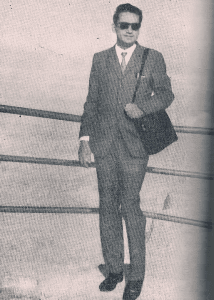Early Life and Poetic Debut
Today marks the death anniversary of Mustafa Zaidi. He was a renowned Pakistani poet and writer. Zaidi was born in Allahabad, India, on October 10, 1929. He was the son of a senior CID officer.
He graduated from Allahabad University successfully. At just 18, he published his first poetry book. This collection was titled Zanjirein (Chains). He wrote under the pen name Tegh Allahabadi then. Esteemed poet Firaq Gorakhpuri predicted his greatness. Zaidi published six poetry collections in his short life.

From Lecturer to Civil Service Officer
Zaidi earned an MA in English from Lahore. He taught at Islamia College, Karachi, afterwards. He also lectured at Peshawar University briefly. In 1954, he successfully passed the CSP exam. He entered Pakistan’s prestigious civil service. After training in England, he served extensively. He held posts in Sialkot, Murree, and Lahore. His excellent work earned him the Quaid-e-Azam Medal.
His verse reflected his changing life:
“Jis din se apna tarz-e-faqeerana chhat gaya / Shahi to mil gayi dil-e-shahana chhat gaya.”
Controversy and Tragic End
Zaidi’s civil service career ended abruptly. He was suspended in December 1969. He was then dismissed in May 1970 controversially. It is believed he refused a bribe. This led to him being targeted by General Yahya Khan. Stripped of his job, he fell into deep depression. He was also unable to join his German wife in Europe.
An Enduring Mustafa Zaidi Poetic Legacy
Zaidi’s lifeless body was found on October 12, 1970. This tragedy occurred in his Karachi apartment. Shehnaz Gul, a friend, was found unconscious nearby. The case sparked months of heated public debate. The court ultimately ruled the death a suicide. Mustafa Zaidi Poetic Legacy lives on through his ghazals. His verses explore profound emotional turbulence and deceit.
His famous couplet asks:
“Main kis ke haath pe apna lahu talash karun / Tamam sheher ne pehne hue hain dastane.”


